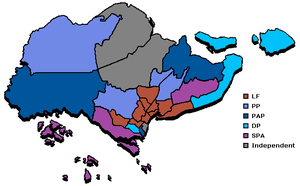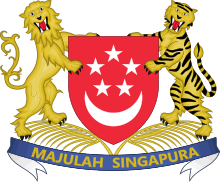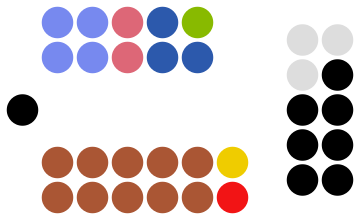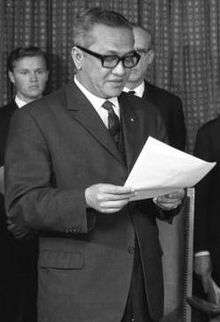1955 Singaporean general election
General elections were held in Singapore on 2 April 1955 to elect the 25 elected seats in the Legislative Assembly. Nomination day was on 28 February 1955.
| |||||||||||||||||||||||||||||||||||||||||||||||||||||||||||||||||||||||||||||||||||||||||||||||||||||||||||||||||||||||
25 (of the 32) seats to the Legislative Assembly | |||||||||||||||||||||||||||||||||||||||||||||||||||||||||||||||||||||||||||||||||||||||||||||||||||||||||||||||||||||||
|---|---|---|---|---|---|---|---|---|---|---|---|---|---|---|---|---|---|---|---|---|---|---|---|---|---|---|---|---|---|---|---|---|---|---|---|---|---|---|---|---|---|---|---|---|---|---|---|---|---|---|---|---|---|---|---|---|---|---|---|---|---|---|---|---|---|---|---|---|---|---|---|---|---|---|---|---|---|---|---|---|---|---|---|---|---|---|---|---|---|---|---|---|---|---|---|---|---|---|---|---|---|---|---|---|---|---|---|---|---|---|---|---|---|---|---|---|---|---|---|
| |||||||||||||||||||||||||||||||||||||||||||||||||||||||||||||||||||||||||||||||||||||||||||||||||||||||||||||||||||||||
 | |||||||||||||||||||||||||||||||||||||||||||||||||||||||||||||||||||||||||||||||||||||||||||||||||||||||||||||||||||||||
| |||||||||||||||||||||||||||||||||||||||||||||||||||||||||||||||||||||||||||||||||||||||||||||||||||||||||||||||||||||||
 |
|---|
| This article is part of a series on the politics and government of Singapore |
|
Related topics |
|
|
Background
Following the promulgation of the Rendel Constitution, the 1955 elections were the first occasion on which a majority of the seats were to be elected rather than be appointed by the colonial authorities. The new constitution was written after recommendations by a committee to grant local citizens more autonomy, headed by George Rendel, were passed.
According to the new Constitution, locals would share executive power with the colonial authorities and there would be a Chief Minister among elected legislators. The number of elected seats was increased to 25, with the British government appointing the remaining seven members. For the first time, political parties were permitted to adopt a standard party symbol for all their candidates and independents to select theirs instead of balloting for them[1]
The Governor of Singapore and Colonial Secretary posts were replaced by a Chief Secretary, who inherited the power to appoint four nominated Assembly Members. Also scrapped were the seats of the Solicitor-General, two directors, two ex-officios, the three commercial organisations and the City Council representative.
Timeline
| Date | Event |
|---|---|
| 5 February | Dissolution of the Legislative Council |
| 28 February | Nomination Day |
| 2 April | Polling day |
| 6 April | Inauguration of David Marshall as Chief Minister |
| 7 April | Formation of Council of Ministers |
| 22 April | Opening of 1st Legislative Assembly |
Changes in electoral boundaries
| Constituency | Divisions formed from |
|---|---|
| Bukit Panjang | Bukit Timah & Seletar |
| Cairnhill | Balestier, Rochore & Tanglin |
| Farrer Park | Balestier |
| Geylang | Katong |
| Havelock | City, Keppel & Tanglin |
| Kampong Kapor | Rochore |
| Pasir Panjang | Bukit Timah & Keppel |
| Paya Lebar | Changi & Katong |
| Punggol–Tampines | Changi |
| Queenstown | Bukit Timah, Keppel & Tanglin |
| Sembawang | Bukit Timah & Seletar |
| Serangoon | Balestier, Changi & Seletar |
| Southern Islands | Bukit Timah & Keppel |
| Stamford | City & Rochore |
| Tanjong Pagar | City & Keppel |
| Telok Ayer | City |
| Tiong Bahru | Keppel |
| Ulu Bedok | Changi |
| Whampoa | Balestier |
Results
Much to the surprise for British, who had anticipated a Progressive victory and its leader, Tan Chye Cheng, to emerge as Chief Minister, it was the Labour Front that garnered the most seats and its chairman, David Marshall, thus became Singapore's first Chief Minister. Both losing and winning parties were shocked by the results.[2] Labour Front formed a government with support of the Malayan Chinese Association (MCA), UMNO and the Malay Union.
In its first elections, the newly formed People's Action Party, led by lawyer and former Progressive Party election agent Lee Kuan Yew, chose to field only a handful of candidates to protest against the Rendel Constitution. As independent member Ahmad bin Ibrahim joined PAP following the election, PAP had 4 members in the Assembly and thus Lee became the new Leader of the Opposition.[3]
 | ||||||
| Party | Votes | % | Seats | +/– | ||
|---|---|---|---|---|---|---|
| Labour Front | 42,300 | 27.1 | 10 | New | ||
| Progressive Party | 38,695 | 24.8 | 4 | –2 | ||
| Democratic Party | 32,115 | 20.5 | 2 | New | ||
| People's Action Party | 13,634 | 8.7 | 3 | New | ||
| Malayan Chinese Association (SA) | 6,203 | 4.0 | 1 | New | ||
| United Malays National Organisation (SA) | 5,721 | 3.7 | 1 | New | ||
| Labour Party | 1,325 | 0.8 | 0 | –2 | ||
| Malay Union (SA) | 1,233 | 0.8 | 1 | New | ||
| Independents | 15,098 | 9.7 | 3 | +2 | ||
| Invalid/blank votes | 1,751 | – | – | – | ||
| Total | 158,075 | 100 | 25 | +16 | ||
| Registered voters/turnout | 300,199 | 52.7 | – | – | ||
| Source: Singapore Elections | ||||||
By constituency
| Constituency | Electorate | Party | Candidate | Votes | % |
|---|---|---|---|---|---|
| Bukit Panjang | 8,012 | Goh Tong Liang | 3,097 | 72.21 / 100 | |
| Lim Wee Toh | 1,192 | 27.79 / 100 | |||
| Bukit Timah | 9,173 | Lim Chin Siong | 3,259 | 52.45 / 100 | |
| Tan Wah Meng | 1,308 | 21.05 / 100 | |||
| A. N. Mitra | 924 | 14.88 / 100 | |||
| S. F. Ho | 722 | 11.62 / 100 | |||
| Cairnhill | 13,528 | David Saul Marshall | 3,305 | 47.58 / 100 | |
| Tan Chye Cheng | 2,530 | 36.42 / 100 | |||
| Tan Khiang Khoo | 1,111 | 16.00 / 100 | |||
| Changi | 11,239 | Lim Cher Kheng | 2,624 | 45.08 / 100 | |
| S. G. Mohamed Ghows | 1,699 | 29.19 / 100 | |||
| Wong Sau Sheung | 1,498 | 25.73 / 100 | |||
| Farrer Park | 12,242 | Anthony Rebeiro Lazarous | 2,585 | 38.52 / 100 | |
| Chengara Veetil Devan Nair | 2,219 | 33.07 / 100 | |||
| Eric Wee Sian Beng | 1,784 | 26.59 / 100 | |||
| Independent | C. T. B. Unnithan | 85 | 1.27 / 100 | ||
| Independent | Chua Kim Watt | 37 | 0.55 / 100 | ||
| Geylang | 16,604 | Mak Pak Shee | 2,756 | 41.17 / 100 | |
| Independent | Goh Hood Kiat | 1,386 | 20.71 / 100 | ||
| Labour Party | Lee Yong Min | 1,325 | 19.80 / 100 | ||
| Lam Joon Chong | 1,226 | 18.32 / 100 | |||
| Havelock | 12,835 | Lim Yew Hock | 5,744 | 86.48 / 100 | |
| Independent | C. S. Soh | 525 | 7.90 / 100 | ||
| Chua Bock Kwee | 373 | 5.62 / 100 | |||
| Kampong Kapor | 13,815 | Seah Peng Chuan | 3,253 | 45.60 / 100 | |
| Independent | Caralapati Raghaviah Dasaratha Raj | 2,155 | 30.21 / 100 | ||
| Wong Shian Yein | 1,283 | 17.98 / 100 | |||
| Lim Kian Lee | 443 | 6.21 / 100 | |||
| Katong | 22,196 | Armand Joseph Braga | 4,680 | 45.66 / 100 | |
| Christopher John Laycock | 2,965 | 28.93 / 100 | |||
| Chan Wah Chip | 2,605 | 25.41 / 100 | |||
| Pasir Panjang | 13,812 | Wong Foo Nam | 3,546 | 45.17 / 100 | |
| K. Mohd S. Hamid | 2,370 | 30.19 / 100 | |||
| P. V. Krishnan | 1,306 | 16.63 / 100 | |||
| Leong Foon Chew | 629 | 8.01 / 100 | |||
| Paya Lebar | 12,827 | Lim Koon Teck | 3,330 | 52.07 / 100 | |
| Tan Eng Joo | 3,065 | 47.93 / 100 | |||
| Punggol-Tampines | 6,628 | Goh Chew Chua | 2,127 | 55.38 / 100 | |
| Anthony Goh | 918 | 23.90 / 100 | |||
| H. A. De Silva | 796 | 20.72 / 100 | |||
| Queenstown | 7,015 | Lee Choon Eng | 2,792 | 67.28 / 100 | |
| Murray Bruce Brash | 736 | 17.73 / 100 | |||
| Elizabeth Choy-Yong Su Mei | 622 | 14.99 / 100 | |||
| Rochore | 12,073 | Tan Theng Chiang | 2,929 | 46.25 / 100 | |
| Ong Eng Lian | 1,897 | 29.95 / 100 | |||
| Soh Ghee Soon | 1,507 | 23.80 / 100 | |||
| Sembawang | 10,675 | Independent | Ahmad bin Ibrahim | 4,281 | 63.24 / 100 |
| Lee Kim Kee | 2,488 | 36.76 / 100 | |||
| Seletar | 9,402 | Independent | Madai Puthan Damodaran Nair | 1,771 | 31.83 / 100 |
| Independent | Lek Poh Song | 1,632 | 29.33 / 100 | ||
| Tan Leong Teck | 1,252 | 22.50 / 100 | |||
| Khew Pee Ging | 909 | 16.34 / 100 | |||
| Serangoon | 8,402 | Lim Choon Mong | 2,172 | 45.83 / 100 | |
| Lim Chye Seng | 1,412 | 29.80 / 100 | |||
| Lim Siew Ek | 1,155 | 24.37 / 100 | |||
| Southern Islands | 3,548 | Mohamed Sidik bin Abdul Hamid | 1,233 | 50.57 / 100 | |
| Hollupatherage James Caldera Kulasingha | 1,205 | 49.43 / 100 | |||
| Stamford | 13,207 | Jumabhoy Mohamed Jumabhoy | 2,691 | 43.08 / 100 | |
| Independent | T. A. Simon | 1,281 | 20.51 / 100 | ||
| Nazir Ahmad Mallal | 1,153 | 18.46 / 100 | |||
| Ng Sen Choy | 1,121 | 17.95 / 100 | |||
| Tanglin | 16,177 | John Anthony Moore Ede | 3,214 | 45.67 / 100 | |
| Lim Yong Bock | 2,501 | 35.54 / 100 | |||
| Lim Seow Chuan | 1,322 | 18.79 / 100 | |||
| Tanjong Pagar | 13,430 | Lee Kuan Yew | 6,029 | 78.33 / 100 | |
| Peter Lim Seck Tiong | 908 | 11.80 / 100 | |||
| Lam Thian | 760 | 9.87 / 100 | |||
| Telok Ayer | 11,547 | Independent | Rajabali Jumabhoy | 1,945 | 39.90 / 100 |
| Sng Siak Hwee | 1,453 | 30.30 / 100 | |||
| Tan Ewe Chee | 1,660 | 29.80 / 100 | |||
| Tiong Bahru | 12,664 | William Tan Ah Lek | 2,264 | 38.60 / 100 | |
| Foo Few Ting | 2,100 | 35.80 / 100 | |||
| Teo Seng Bee | 1,502 | 25.60 / 100 | |||
| Ulu Bedok | 16,903 | Abdul Hamid bin Jumat | 5,721 | 61.04 / 100 | |
| Toh Seng Sit | 2,999 | 32.00 / 100 | |||
| Abdul Hamid bin Rahmat | 652 | 6.96 / 100 | |||
| Whampoa | 12,345 | Chew Swee Kee | 2,961 | 45.88 / 100 | |
| Thio Chan Bee | 2,565 | 39.75 / 100 | |||
| Lee Kok Liang | 927 | 14.37 / 100 | |||
| Source: ELD | |||||
References
- "1955 Legislative Assembly general election". National Library Board. 24 January 2018. Retrieved 18 August 2019.
- "1955 Legislative Assembly general election". National Library Board. 24 January 2018. Retrieved 18 August 2019.
- "History of leader of Opposition in S'pore, from LKY to Chiam See Tong and Low Thia Khiang". mothership.sg. 18 February 2018. Retrieved 9 July 2020.
- Sr, Pugalenthi (1996) Elections in Singapore VJ Times International Pte Ltd, Singapore ISBN 981-221-025-3
External links
- General Elections 1955 Singapore Elections
- Results of 1955 election in Singapore
%2C_School_of_Law%2C_Singapore_Management_University_-_20150401-02.jpg)


.jpg)
